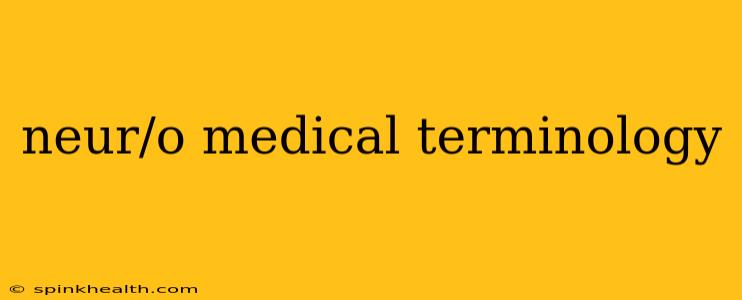Decoding the Language of the Nervous System: A Journey into Neuro Medical Terminology
The human nervous system, a breathtakingly complex network orchestrating every thought, movement, and sensation, has its own intricate language: neuro medical terminology. For those outside the medical field, navigating this lexicon can feel like deciphering an ancient code. But fear not! This journey will illuminate the most common terms, revealing the stories they tell about the brain, spinal cord, and nerves.
Imagine yourself as a detective investigating a medical mystery. Each term is a clue, leading you closer to understanding the patient's condition. Let's begin unraveling some of these crucial clues.
What are the main branches of neurology?
Neurology is a vast field, encompassing numerous specializations. The main branches often overlap and work together to provide a holistic understanding of neurological disorders. Think of it as a team of detectives, each with their area of expertise, collaborating to solve a complex case. Some key branches include:
- Neuro-oncology: Focusing on brain tumors and other cancers affecting the nervous system. These specialists are like forensic scientists, meticulously analyzing the nature and spread of these tumors.
- Neuromuscular medicine: Investigating diseases affecting the muscles and nerves that control them – essentially the communication system between brain and muscle. These detectives specialize in the intricate pathways of nerve signals.
- Neurophysiology: Studying the electrical and chemical functions of the nervous system. They're the electrical engineers of the team, analyzing the signals that keep the nervous system humming.
- Neuropsychology: Exploring the relationship between brain function and behavior. They are the behavioral analysts, examining how neurological conditions impact cognitive functions, personality, and emotions.
- Stroke medicine: Specializing in the prevention, diagnosis, and treatment of strokes. These are the rapid response units, working against the clock to minimize damage from a sudden interruption of blood flow to the brain.
What are common neurological prefixes and suffixes?
Understanding prefixes and suffixes is like learning the alphabet of neuro medical terminology. These small word parts hold significant meaning. Let's explore a few:
- -algia: Pain (e.g., neuralgia – nerve pain)
- -ectomy: Surgical removal (e.g., craniotomy – surgical opening of the skull)
- -itis: Inflammation (e.g., encephalitis – inflammation of the brain)
- -oma: Tumor (e.g., glioma – tumor arising from glial cells in the brain)
- Neuro-: Relating to the nerves (e.g., neurotransmitter – chemical messenger in the nervous system)
What are some examples of common neurological diseases?
The cases our "detectives" handle are varied and complex. Some frequently encountered diseases include:
- Alzheimer's disease: A progressive neurodegenerative disorder characterized by memory loss and cognitive decline.
- Multiple sclerosis (MS): An autoimmune disease affecting the brain and spinal cord, causing a range of symptoms, including muscle weakness, numbness, and vision problems.
- Parkinson's disease: A neurodegenerative disorder characterized by tremors, rigidity, and slow movement.
- Epilepsy: A neurological disorder causing seizures, which are sudden bursts of abnormal electrical activity in the brain.
- Stroke: A sudden interruption of blood flow to the brain, leading to brain cell damage.
How can I learn more about neuro medical terminology?
Becoming fluent in this language requires dedicated effort, but the rewards are immeasurable. Several avenues exist:
- Medical dictionaries and textbooks: These provide comprehensive definitions and explanations of terms.
- Online resources: Many websites and educational platforms offer courses and materials on neuro medical terminology.
- Medical terminology courses: Formal courses offer structured learning and expert guidance.
Mastering neuro medical terminology is not just about memorizing words; it's about understanding the underlying processes and conditions of the nervous system. Each term is a piece of a larger puzzle, revealing the intricate workings of one of the body's most fascinating and vital systems. By understanding this language, we gain a deeper appreciation for the complexity and resilience of the human brain and nervous system.

